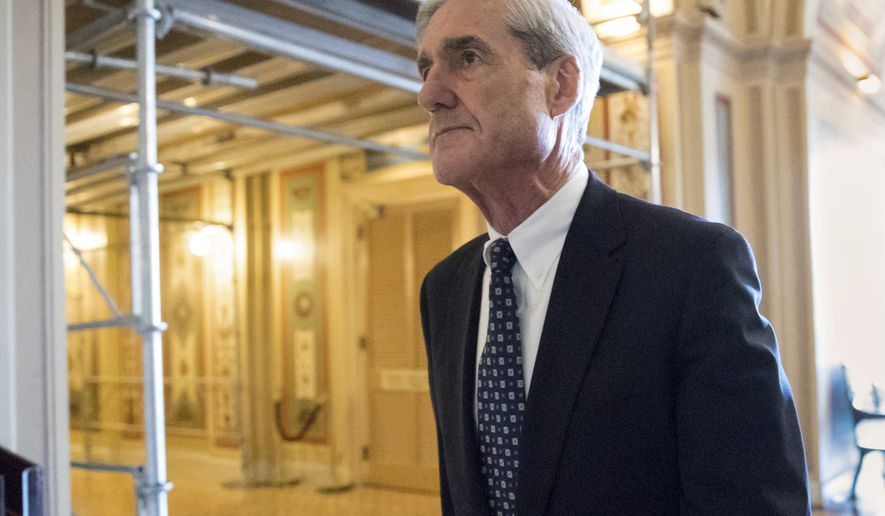OPINION:
If you are having a hard time keeping track of special counsel Robert Mueller’s investigation into Russia’s interference in the 2016 presidential election, you are not alone.
When President Trump got rid of Attorney General Jeff Sessions earlier this month by forcing his resignation, it left him open to pick Matthew G. Whitaker (who was previously Mr. Sessions’ chief of staff) as acting attorney general.
Mr. Whitaker was chosen by Mr. Trump primarily because he has criticized Mr. Mueller’s investigation and Mr. Sessions had no role in the investigation, because he recused himself from any oversight role in Mr. Mueller’s probe at his Senate confirmation hearing, admitting he had lied about talking to the Russian ambassador to the United States.
That left Deputy Attorney General Rod J. Rosenstein in charge of the investigation, In May 2017, he appointed Mr. Mueller, who hit the ground running.
Since then, Mr. Mueller’s team of investigators have charged four Americans who were part of Mr. Trump’s campaign or his administration, plus 13 Russian nationals, 12 Russian intelligence officers and three Russian companies, among others.
Throughout the investigation, convictions, guilty pleas and other court actions, Mr. Trump continued to insist, and still insists, that Mr. Mueller and his team were conducting “a witch hunt,” and that the whole story about Russia’s cyberwar interference in the 2016 election was “fake news.”
Since Mr. Trump appointed Mr. Whitaker as acting attorney general, there have been a growing number of suspicions, rumors and assorted reports that he would call an end to Mr. Mueller’s remaining investigation
The president appeared to be promoting that outcome when he said on Fox News Sunday that he would not interfere if Mr. Whitaker were to bring a halt to Mr. Mueller’s investigation. “Look, it’s going to be up to him [Whitaker]. I would not get involved.”
He said that he didn’t know about Mr. Whitaker’s criticisms of Mr. Mueller’s investigation before he appointed Mr. Whitaker. So much for thorough vetting of his administration’s officials.
Mr. Trump also appeared to shut the door on sitting down with Mr. Mueller’s team to answer their questions.
“I think we’ve wasted enough time on this witch hunt and the answer is probably: We’re finished,” Mr. Trump said, adding that he had given “very complete answers to a lot of [their] questions.”
But that’s not the message Mr. Mueller’s team laid out in a court filing on Monday, explaining that Mr. Whitaker will have no authority over the investigation.
That was the response from the special counsel to an inquiry from the U.S. Court of Appeals for the D.C. Circuit “in a case brought by Andrew Miller, an associate of Roger Stone, a longtime adviser to President Trump,” The Washington Post reported Tuesday.
After hearing oral arguments earlier this month, a three-judge panel is facing separate court challenges about the validity of Mr. Whitaker’s role in the investigation.
“The designation has no effect on the case,” Mr. Mueller’s team said of Mr. Whitaker’s new position. “The validity of the Special Counsel’s “appointment” in May 2017 “cannot be retroactively affected by a change in the official who is serving as the Acting Attorney General,” The Post reported.
If this sounds like Mr. Trump is operating on shaky legal grounds in his attempt to bring Mr. Mueller’s work to an end, read this:
“In recent rulings, two district court judges in Washington — one nominated by a Democrat, the other by Trump — have upheld the constitutionality of Mueller’s appointment,” The Post reported.
A growing number of other legal officials also question his authority to run the Justice Department or to restrict the parameters of the special counsel’s investigation.
Maryland Attorney General Brian E. Frosh, a Democrat, said in a court filing last week that, until Mr. Whitaker is confirmed by the Senate, he does not have the legal authority to run the Justice Department.
So far, special counsel Robert S. Mueller III has proven beyond a shadow of a doubt that the Kremlin was waging a massive, divisive cyberwar campaign on our elections, with the help of American political operatives to poison our free democratic process.
Now we are waiting for Mr. Mueller to name names to show how far up this politically criminal plot went in the 2016 presidential elections and the Trump campaign.
• Donald Lambro is a syndicated columnist and contributor to The Washington Times.




Please read our comment policy before commenting.